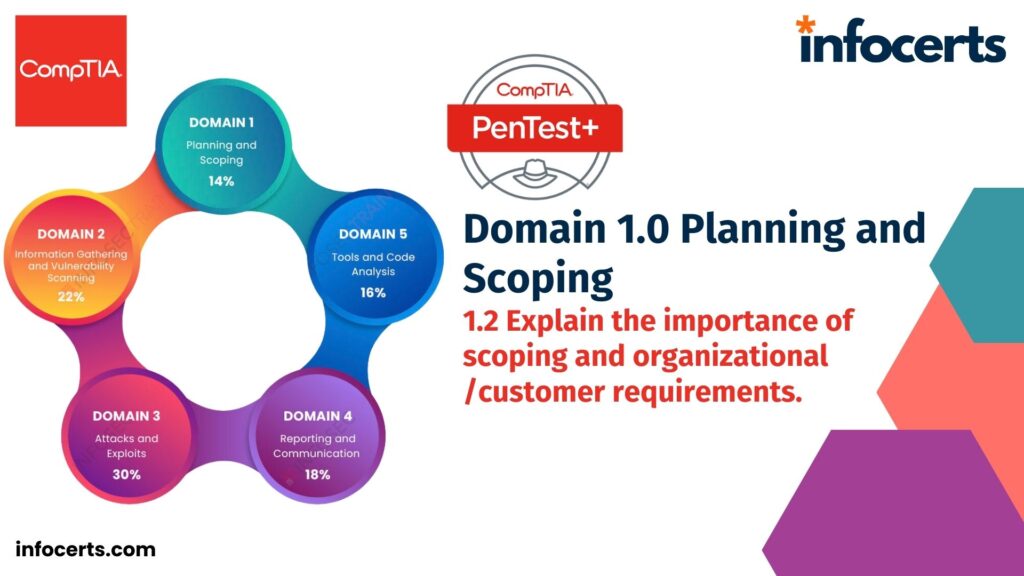Domain 1.0 Planning and Scoping
In the realm of cybersecurity, scoping is a fundamental aspect of penetration testing, defining the boundaries and objectives of the assessment. In this blog post, we will explore the importance of scoping and organizational/customer requirements, along with relevant standards, methodologies, rules of engagement, environmental considerations, and methods to validate the scope of engagement, as outlined in the Comptia Pentest+ certification.
Importance of Scoping and Organizational/Customer Requirements
Standards and Methodologies
Penetration testing relies on established standards and methodologies to ensure thorough assessments. Here are some key frameworks:
- MITRE ATT&CK: Describes Adversary Tactics and techniques, aiding in identifying security gaps.
- Open Web Application Security Project (OWASP): Provides guidance on securing web applications and APIs against common vulnerabilities.
- National Institute of Standards and Technology (NIST): Offers a comprehensive set of cybersecurity standards and guidelines.
- Open-source Security Testing Methodology Manual (OSSTMM): Provides a methodology for security testing, including penetration testing.
- Penetration Testing Execution Standard (PTES): Defines a standard methodology for conducting penetration tests.
- Information Systems Security Assessment Framework (ISSAF): Offers guidance on assessing and mitigating security risks.
Rules of Engagement
Clear rules of engagement ensure that the penetration test aligns with the organization’s objectives and constraints. These may include:
- Time of Day: Specifies when testing can occur to minimize disruption to operations.
- Types of Allowed/Disallowed Tests: Defines what types of tests are permitted or prohibited.
- Other Restrictions: Additional constraints such as avoiding certain systems or services.
Environmental Considerations
Understanding the environment being tested is crucial for effective penetration testing. Considerations include:
- Network: Assessing network infrastructure and security controls.
- Application: Evaluating the security of web applications, APIs, and other software.
- Cloud: Assessing security controls and configurations in cloud environments.
Target List/In-Scope Assets
Identifying the targets and assets in scope ensures that the assessment addresses the organization’s security needs. This may include:
- Wireless Networks: Assessing the security of wireless access points and networks.
- Internet Protocol (IP) Ranges: Identifying IP ranges to be tested.
- Domains: Evaluating the security of domain infrastructure.
- Application Programming Interfaces (APIs): Assessing the security of APIs used by applications.
- Physical Locations: Evaluating physical security controls.
- Domain Name System (DNS): Assessing the security of DNS infrastructure.
- External vs. Internal Targets: Distinguishing between external-facing and internal systems.
- First-Party vs. Third-Party Hosted: Assessing systems hosted by the organization versus third-party providers.
Validate Scope of Engagement
Validating the scope ensures that the penetration test meets the organization’s requirements and expectations. Methods for validation include:
- Questioning the Client/Reviewing Contracts: Clarifying objectives and constraints.
- Time Management: Ensuring efficient use of time and resources.
- Strategy: Choosing between testing in unknown environments versus known environments.
Enroll in Comptia Pentest+ Certification
At XYZ Cybersecurity Training, we provide comprehensive training on penetration testing, covering scoping, methodologies, and best practices outlined in the Comptia Pentest+ certification. To enroll, contact us at Infocerts Cybersecurity Training or call +91 70455 40400.
In conclusion, scoping is a critical aspect of penetration testing, ensuring that assessments are targeted, effective, and aligned with organizational goals and constraints.
Infocerts Cybersecurity Training | +91 70455 40400

